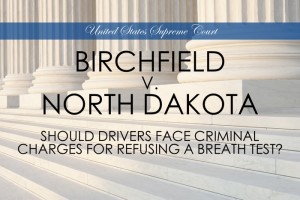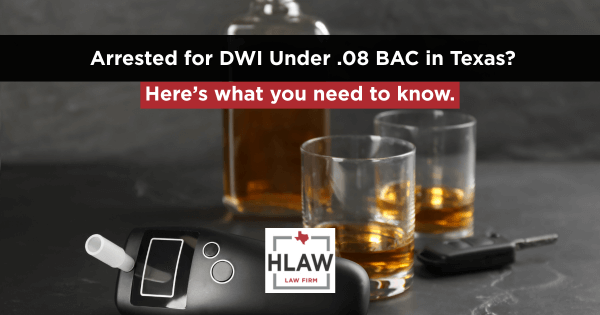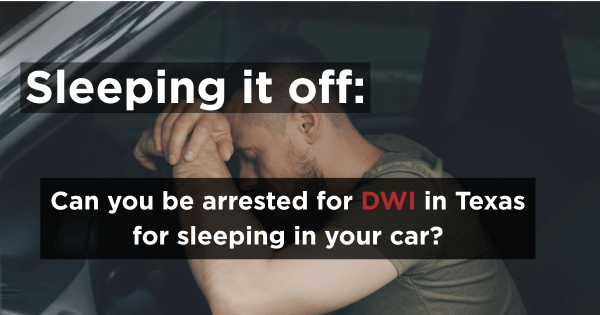SCOTUS Hears Oral Argument in Birchfield v. North Dakota
 On April 20, 2016, the Supreme Court of the United States (“SCOTUS”) heard oral arguments in Birchfield v. North Dakota, a case that consolidates Birchfield with Bernard v. Minnesota and Beylund v. Levi, where the SCOTUS will determine whether the government may, without a warrant, make it a crime for a motorist to refuse to take a blood-alcohol test. Currently, thirteen states make it a crime to refuse any form of drunk-driving tests (breathalyzer, field sobriety, etc.). Birchfield comes on the heels of the 2013 Missouri v. McNeely case, where the SCOTUS held that if police have time, they should get a warrant before taking an invasive test of a suspected drunk driver. Let’s take a look at each consolidated case to understand the big issue before the Supreme Court.
On April 20, 2016, the Supreme Court of the United States (“SCOTUS”) heard oral arguments in Birchfield v. North Dakota, a case that consolidates Birchfield with Bernard v. Minnesota and Beylund v. Levi, where the SCOTUS will determine whether the government may, without a warrant, make it a crime for a motorist to refuse to take a blood-alcohol test. Currently, thirteen states make it a crime to refuse any form of drunk-driving tests (breathalyzer, field sobriety, etc.). Birchfield comes on the heels of the 2013 Missouri v. McNeely case, where the SCOTUS held that if police have time, they should get a warrant before taking an invasive test of a suspected drunk driver. Let’s take a look at each consolidated case to understand the big issue before the Supreme Court.
Case #1: Birchfield v. North Dakota
In Birchfield, motorist Danny Birchfield drove his car off of a North Dakota road and subsequently failed a field sobriety test and a preliminary breath test, given by the state highway patrol. At that point Birchfield was arrested, told he had to take another more invasive chemical test, and informed of North Dakota’s implied consent rule. In North Dakota, any individual who operates a motor vehicle on any public or private road in the state is deemed to have consented to a chemical test for alcohol in the blood stream. Birchfield refused to submit to any further testing and was charged with both DUI and Failure to Submit to chemical testing. Birchfield filed several appeals, arguing that North Dakota’s implied consent law is unconstitutional under the 4th Amendment of the United States Constitution. Birchfield is opposed to “refusal” being a crime all by itself.
Read the brief in Birchfield here.
Case #2: Bernard v. Minnesota
In Bernard, police confronted a man who smelled of alcohol on a public boat ramp and asked him to consent to field sobriety tests. Bernard consented to a breathalyzer test after being told of the criminal penalties for refusal. Under Minnesota’s implied consent law, it is a criminal offense for a driver who has been arrested on probable cause for driving while impaired to refuse a chemical test. Minnesota argues that a warrantless breath search is constitutional under the “search incident to an arrest” doctrine. On the other hand, Bernard argues that a breathalyzer is not a valid search incident to an arrest because the search does nothing to further officer safety or to preserve evidence.
Read the brief in Bernard here.
Case #3: Beylund v. Levi
In Beylund, law enforcement observed a car driving erratically and stopping in the middle of the road. The police asked defendant Beylund to consent to chemical testing. At trial, Beylund argued that the test imposed an unconstitutional condition on his driver’s license.
Read the brief in Beylund here.
The Big Issues—Implied Consent or Criminalization of a Constitutional Right?
The highest court will determine whether in the absence of a warrant, a state can make it a crime, in and of itself, for a person to refuse to take a chemical test (blood, breath and urine) to detect the presence of alcohol in the blood? The Supreme Court will likely be examining the following questions to determine the answer to that question:
- When drivers obtain a driver’s license from a state agency, does a driver impliedly consent to invasive chemical testing to detect the presence of alcohol?
- Is refusing an invasive chemical test criminal in and of itself?
- Do citizens have the constitutional right to refuse an invasive chemical test without penalty?
- Do states have a compelling interest in protecting public roadways from drunk driving so that they may order chemical testing for suspected drunk drivers even without a warrant?
- Can a government benefit (such as driving on public roadways) be conditioned upon search requirements, even if the search is an invasive chemical test?
Precedent Case: Missouri v. McNeely
Driving While Intoxicated and invasive chemical testing are not new topics to the SCOTUS. In 2013, the Court heard Missouri v. McNeely. Defendant McNeely had been arrested for DUI after failing field sobriety tests. He refused to take a breathalyzer, so law enforcement transported him to a hospital where his blood was removed against his will. After several appeals and suppression hearings, McNeely was heard by the SCOTUS. Chief Justice Sonia Sotomayor reiterated that a blood draw “is an invasion of bodily integrity that implicates the most personal and deep-rooted expectations of privacy.” Although the SCOTUS noted that from time to time cases may arise that will allow for a warrantless blood alcohol test, the Court ultimately held, “in drunk driving investigations, the natural dissipation of alcohol in the bloodstream does not constitute an exigency in every case sufficient to justify conducting a blood test without a warrant.”
What Will the Supreme Court Say About Warrantless Breath Tests?
Several national organizations, such a Mothers Against Drunk Driving (see the MADD brief here) and the American Civil Liberties Union (read the ACLU brief here), have filed amicus “friends of the court” briefs for this case arguing for and against the constitutionally of implied consent laws. In the past decade, 112,998 people have been killed in alcohol-impaired driving crashes. With grim statistics underpinning many of the individual states’ implied consent laws, will the Supreme Court overturn or add to McNeely? It will be very interesting to see how the SCOTUS squares this case with the precedent case law and which legal theory they will select to reach a conclusion.










